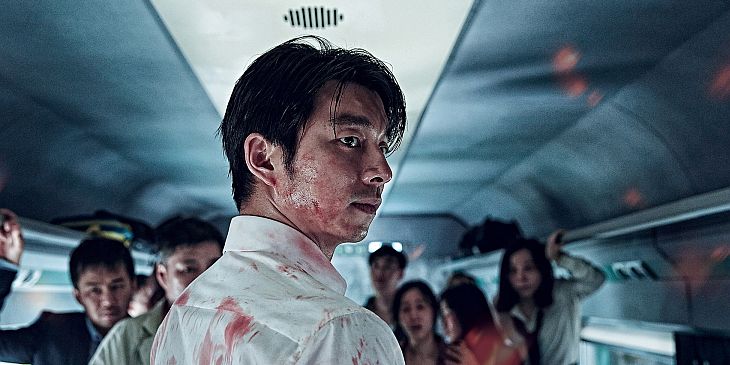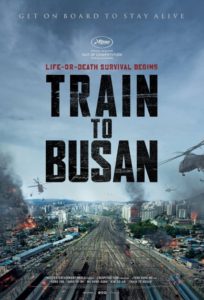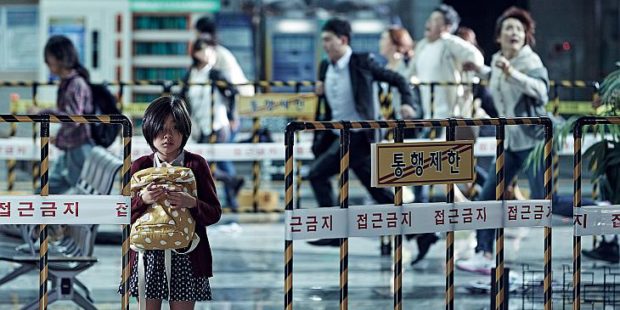Summary
A novel take on a familiar genre, in this tense South Korean zombie movie that combines claustrophobia and siderodromophobia with the fear of being eaten.
The zombie genre was an inevitable perfect fit for South Korea’s Yeon Sang-ho. Flesh-eating films have long had a current of social commentary running through them, from George Romero to The Walking Dead, the post-apocalypse is a mirror to our own world. Yeon’s animated debut The King of Pigs tackled bullying and systemic poverty, while his follow-up The Fake took a swing at organised religion. TRAIN TO BUSAN (부산행) takes a much broader approach, pitching classes against each other as they are attacked by cannibalistic crazies within the confines of public transport.
Like many of these things, it begins quietly, albeit with a zombie deer on the fringes of a contamination zone. Against the backdrop of some strange happenings in Seoul, fund manager Seok-Woo (Gong Woo) is too wrapped up in his own career to spend time with his daughter Su-an (Kim Su-an), but agrees to accompany her on a birthday train trip to visit his estranged wife in Busan. However, when a single infected passenger sneaks aboard the high-speed KTX, all hell breaks loose as the healthy travellers board themselves up, fighting off the hungry hoards until they reach their final destination.
There’s a 28 Days Later level of intensity to TRAIN TO BUSAN, partly thanks to the terrifyingly rapid speed at which the fallen humans convert to zombies. Throughout the film, moments of silence are punctuated by focused tension, whether it is a speeding fire truck or an oncoming horde of the undead. This carries over to the biggest set piece of the film, the primary bit of train travel, and a series of brutal attacks as a small group attempts to make its way through the carriages to relative safety. Park Joo-suk’s script spends a little too much time languishing in the second act, where repetition takes over from the initial scares, but they all serve to demonstrate the ugly side of humanity that rears its head in times of crisis.
As such, TRAIN TO BUSAN ticks off the mandatory characters in the canon: there’s young love, a high-school baseball team, elderly sisters, the muscle, and the outraged businessman. There’s even a pregnant woman on board, although Yeon wisely chooses to avoid placing any pets in peril. While these character ornaments would be purely perfunctory in most zombie flicks, and they are here to some extent, Yeon is making a very sweeping statement about the structure of the classes in South Korean society. The over-the-top corporate COO, who quite literally throws fellow survivors under a train for his own preservation, is an easy allegory for the super rich being able to manipulate the masses around him into blindly following.
On other levels, Yeon’s film is technically inventive and stylish. Wide city shots effectively convey the epic and ubiquitous nature of the epidemic, and give a sense of grandeur to the otherwise confined plotting. The clever use of light, as the survivors take advantage of the darkness of the tunnels to evade the monsters, is one of cool additions to the canon. As the film reaches one of many dramatic climaxes, there’s almost too much happening in the final third. Indeed, once the action leaves the train proper, Yeon lurches from one disaster to the next as it builds towards an emotionally overwrought denouement.
While Hollywood is no doubt battling for the remake rights, TRAIN TO BUSAN can stand alone as a tense dissection of the South Korean class system and a ripping zombie film premise. Keen fans wanting to see more can keep it in the family with the animated film Seoul Station, Yeon’s prequel to the events of this film. While this may not change the way you think about zombie films forever, and it certainly feels cleaner than the gore fest we see in mainstream Western outings, it’s a energetic action thriller that can proudly sit beside its contemporaries.
2016 | South Korea | DIR: Yeon Sang-ho | WRITER: Park Joo-suk | CAST: Gong Yoo, Kim Su-an, Jung Yu-mi, Ma Dong-seok, Choi Woo-shik, Ahn So-hee | RUNNING TIME: 118 minutes | DISTRIBUTOR: Cine Asia (AUS)






